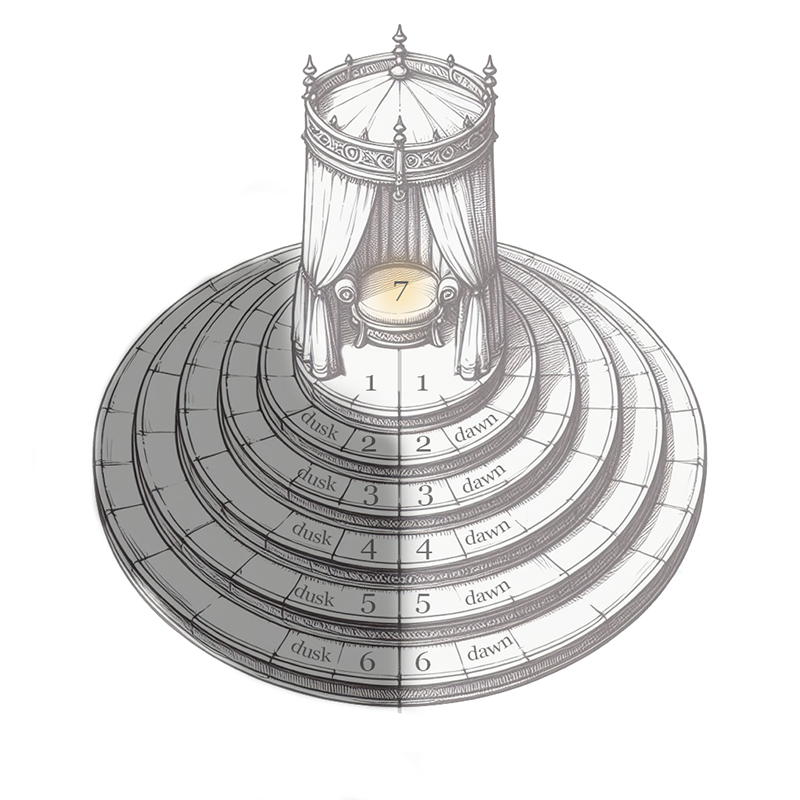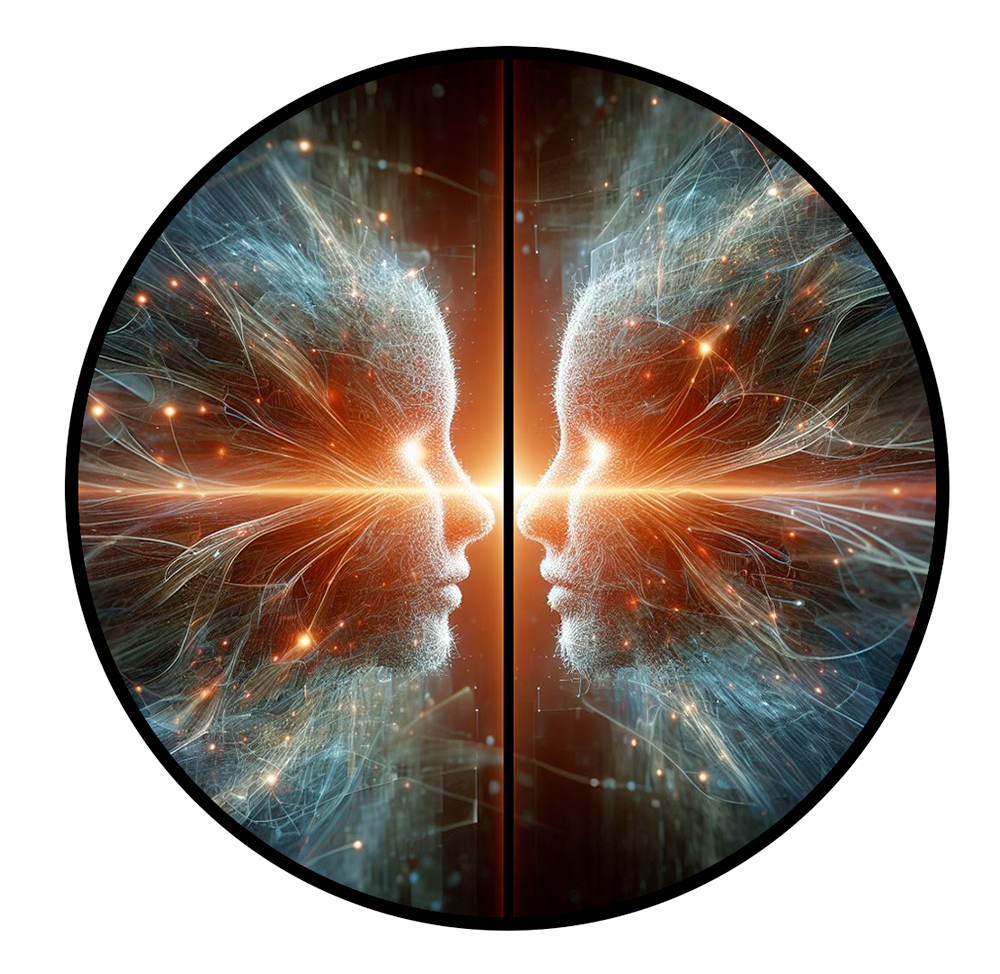 Genesis 1:1
Genesis 1:1

The Head/Peak
Within the head mighty ones has cut out the self eternal dual Heavenly ones and the self eternal Earth.
Climb up the Ladder/Stairs in the Foundation.
In the beginning God formed the heavens and the earth.
In the beginning God created the heavens and the earth;
In the beginning, God created the heavens and the earth.
In the beginning God made the heaven and the earth.
Footnotes
| 3 | The Origin > Head > Source - The Mother of Life/Death Strong’s #7225, reshit, [feminine] head. This is the feminine of rosh, #7218. The root of these words is unused but means to shake, tremble. Understood to mean “head” (because it shakes) and long interpreted here in the abstract as “beginning of time." Time? Everywhere that I can tell, this word “head” is used in the sense of “headwaters”, that is a source, or a mountain peak. A “source” could be construed as a “beginning” but the sense is not that of normal time, and I have seen nothing in scripture which would indicate that rosh/reshit are related to space-time. In fact, it should be known there is no word for “time” in the sense of clock time, atomic time, linear time, or space-time in the Hebrew. There is only appointed time, season, menstruation time, then, now, perpetuity, and time of tomorrow, time of the evening. See #6256. The writers chose the feminine version of head here. Why? Here lies perhaps the most enigmatic mystery of the Bible. There are a few root verbs that are symmetrical: hayah (to become), nun (to propagate), and harah (to conceive). These are some of the most significant in all of the Hebrew language. They reflect opposites. Taking the individual letters as a cue: היה hayah: [Look - the hand - Look] to become נונ nun: [seed - peg/nail - seed] to propogate הרה harah: [Look - head - Look] to conceive  With this understanding, "In the head" would refer to the very conception of life itself. Life conceived. Elohim conceived. Eve the "Mother of All the Living Ones". The Mother of all real life. Imagine how beautiful she must be, when she manifests in all her glory? |
| 5 | Strong’s #1245, bara. To cut out, carve out, form by cutting. “cutting, shape out, pare a reed for writing, a stick for an arrow” See Gesenius, BDB, Fuerst, etc. Think of a lump of something or a crude, rough object being shaped into something good. This verb to cut/carve out is in the Hebrew perfect, which means the action is complete. This tells us how the beginning is the end and we now “run toward” the completion, Today, hastening it according to Peter, or running the race set-in-front of ourselves (Heb. 12:1). When elohim “remembers” something (Gen. 8:1, 9:15, 16. 19:29, etc.) he/they are “remembering” what has already happened/become in the future. |
| 4 | God is the People Strong’s #430, elohim. Gods, mighty-ones, exceeding-ones, very great ones. Rabbis and scholars have debated for centuries over what exactly this word means. And for good reason. They didn't want to hear what is clearly the simplest and most unadulterated meaning. The main difficulty lies in the usage of a masculine singular verb with a plural subject. Where the subject-verb is supposed to agree in number, in this special case it does not. On grammatical grounds the rule is broken. Subject-verb agreement is a standard rule in any language with few exceptions. In the case of Greek a 3rd person singular verb can be used with a neuter plural word in which case the third person singular verb is actually read and translated as a plural verb "are." It is known that this was intentional as this disagreement in number happens repeatedly with the word elohim. Why? An astonishing clue lies hidden in the name אליעם (Eliam) which appears in 2 Samuel 11:3, where Eliam is mentioned as the father of Bathsheba ("Daughter of Seven"). He is also referred to as one of King David’s mighty men in 2 Samuel 23:34. Etymology:
Meaning:
Elohim, אלהים, is concretely the plural form of eloah, אלה / אלוֹה (#433) which has the feminine suffix ה- attached. Scholars have treated eloah as a masculine noun and called it "prolonged" or "emphatic". It is found only in the Hebrew poetry and later prophets. Certain biases have dictated that there could be no such word "goddess" in the Hebrew. This word however is far easier to interpret as such. Gesenius, the 19th century Hebrew Grammarian who is considered a master of Hebrew, interpreted the unique word לאלהו "le-eloho" in Habakkuk 1:11 as "to his own god", but the problem is with this interpretation is the fact that הו is not a possessive suffix for nouns. It is however a direct object suffix for verbs. Instead, this looks as if eloah is planted in the middle of "to" and "himself". The preposition ל "to" and the proper noun suffix וֹ "of him." This can be translated "to the goddess of himself" —no grammatical rules broken. אל ← אלה ← אלהים el → eloah → elohim Does God beget God? Astonishingly, we find the clue in another name, אליאל Eliel meaning "God is God." Or rather, God begets God through God. Or is God incapable of this? The professionals never seemed to appreciate the feminine noun, or feminine aspect, or feminine verbiage, or feminine narrative witness existing around the Holy Spirit. Some have embraced some form of the Holy Spirit as feminine like a mother. It was present in some Catholic circles, but they were still unable to see it. Because for many scholars and theologians the Holy Spirit is God and that means incontrovertibilis, irrefutabilis, inexpugnabilis, certus, definitus masculine only. Even though a triune nature was recognized, the false doctrine of "only one god forever" prevailed. No such terminology exists in the texts. The true doctrine, as it is written is "GOD IS ONE". A plurality that equals one. It is in this that we understand the reason for the subject verb disagreement. Yet the irony is that everything the Trinitarian Theologian says about God is quite true, only he is blind to his own words. God creates himself and begets himself through himself. That's the Gospel, is it not? A pastor might preach it, but not see it. He who loves his woman, loves himself. But if God has no woman, how then is God...Love? And if Eve, the Mother of Life, be taken from the side of God in the Christ, then she herself is of the same nature. God builds God. And the offspring is also of the same nature, God. Yet at the end of the day, God is still one. A Mathematical / Logical Analysis:Unity of Essence. The concept of "one" being preserved in multiplication can be modeled mathematically through the idea of identity and self-similarity. For example, in set theory, an identity element (such as 1 in multiplication) preserves the unity of the set, even when applied to elements within the set. In a sense, no matter how many elements (gods) are "generated" from the identity (God), the core identity (self) remains unaltered. Self-Similarity and Recursion. The principle of "begetting" implies a recursive relationship, where the process of generation does not alter the original essence. In mathematical terms, this can be viewed as a recursive function where the output of the function (God) feeds back into the input (God), retaining the same essence at each iteration. Thus, each "generation" of God does not create a new or different entity, but rather a reflection or expression of the original unity. Multiplicative Identity. In the realm of arithmetic, the number 1 is known as the multiplicative identity because for any number x, the equation 1 × x = x holds. More notably, when one repeatedly multiplies 1 by itself, one obtains:
Here, no matter how many times the operation (multiplication by 1) is performed, the result remains 1. This is akin to the idea that although God “begets” or “generates” God, the essential nature remains singular and unchanged. Idempotent Elements in Algebra. An element e in an algebraic structure is said to be idempotent if e ∗ e = e where ∗ represents a binary operation (which might be multiplication, union, or some abstract operation). In this sense, if one models the divine nature as an idempotent element, the repeated “begetting” operation (represented by ∗) does not alter the identity of the element:
This model encapsulates the idea that the process of "begetting" does not lead to a fragmented plurality but rather a plurality of iterations or repetitions in the essential divine nature.
Fixed Points Under Functional Iteration. Another perspective comes from the concept of a fixed point in functional analysis. A point xx is a fixed point of a function
then iterating the process yields
and so on. In this scenario, no matter how many times the process is applied, the output remains G, reinforcing the notion of an unchanging, unified entity. The masculine-feminine reality is a paradox that begins with GOD singular and ends with...GOD plural. It's not magic, just math: ויאמר אלהים אל משה אהיה אשר אהיה and elohim is saying toward Moses I am whom I am שמע ישראל יהוה אלהינו יהוה אחד Hear, God-Straightened (Ishra-el), "He Is our-mighty-ones He Is ONE." "He Is our-mighty-ones He Is" אהיה←אשר→אהיה יהוה←אלהינו→יהוה הוה ו (man) Jesus was asked "which is the most important commandment of all?" "The Salvation separated that she is first, 'Hear Israel, Master the God of Ourselves Master, he is one.'" (Mark 12:29 RBT)
|
| 6 | את - The "Accusative Direct Object Marker" or, The Mark of the Eternal Self? Strongs Definitions gives: אֵת ʼêth, ayth; apparent contracted from H226 in the demonstrative sense of entity; properly, self (but generally used to point out more definitely the object of a verb or preposition, even or namely):—[as such unrepresented in English]. See "Mark of the Eternal Self" for complete analysis. |
| 7 | Dual-Heavenly One(s) - Stretched out like Two Hands Strong’s #8064, shamayym. This is a dual word, and only appears in the dual. Heavenly ones, but more specifically, dual heavenly ones as enayyim is the dual word for eyes, a pair of eyes, because we only have two, or kenaphayyim for a pair of wings etc., but more objectively because there is a symmetry or inverse reflection, or type-antitype. The one side is the inverse of the other. Sometimes the word is rendered “heavens” as though it meant something like the English plural “skies”. However, Isaiah 40:22 gives this liberal approach away as incorrect and misleading since the writer uses the masculine plural “he stretches them out” (like a pair of hands) in referring to the “Heavenly-ones”. |
| 8 | Strong’s #776, ha-eretz. The Earth. A feminine noun + definite article. This word is sometimes translated earth, and sometimes as land depending on context. The English word “earth” is not the same as “land” just as “sky” is not the same as “heaven”. |

